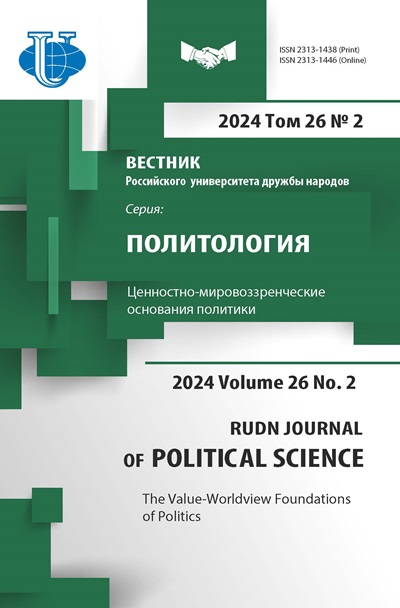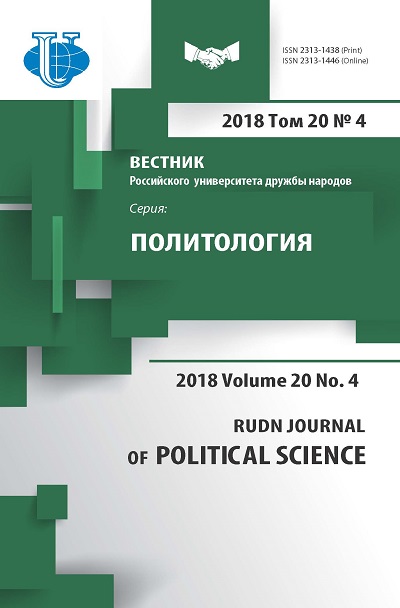ОТНОШЕНИЯ РОССИИ И СТРАН ПЕРСИДСКОГО ЗАЛИВА И ИХ ОТРАЖЕНИЕ В РЕГИОНАЛЬНОМ БАЛАНСЕ НА БЛИЖНЕМ ВОСТОКЕ
- Авторы: Аль-Макбали М.М.1, Иванов В.Г.1
-
Учреждения:
- Российский университет дружбы народов
- Выпуск: Том 20, № 4 (2018)
- Страницы: 536-547
- Раздел: Политические процессы в современном мире
- URL: https://journals.rudn.ru/political-science/article/view/20397
- DOI: https://doi.org/10.22363/2313-1438-2018-20-4-536-547
Цитировать
Полный текст
Аннотация
В статье отражен исторический аспект установления и развития дипломатических отношений России с государствами Арабского залива, анализируется взаимодействие в рамках Совета сотрудничества арабских государств Персидского залива по вопросам безопасности в регионе (отношения по иранскому и сирийскому вопросу, катарский кризис), а также направления военнотехнического сотрудничества, развитие экономических связей, с помощью которых Россия пытается играть все более заметную геополитическую роль в Арабском заливе. Представлены перспективы развития политической ситуации после вывода российских войск из Сирии.
Ключевые слова
Полный текст
Russia began making contact with Gulf States back in 1932, when the USSR became one of the first countries that formally recognized Saudi Arabia and established diplomatic relations with the state. Shortly after, due to the change in the Soviets’ party line (conversion to a new ideology and development of a moderate stance towards regional conflicts), the relations were suspended. The aggravation of international relations in the region was also the result of the competition between the Great Powers, and their respective political ambition. In the light of “West-East” political-military confrontation, the Soviet Union took immediate interest in the latest regional developments. During the Cold War, the Soviet government viewed Gulf States as the United States’ allies, and consequently, Moscow’s adversaries. The Kremlin-Riyadh relations became especially strained after the introduction of Soviet troops on the territory of Afghanistan. In 1990s, the Kingdom’s support of separatism in Kosovo and Chechnya became a large stumbling block in the two states’ relations. At the time, however, due to a growing rapport between Moscow and the West, Russia-Saudi Arabia relations shifted to the background of the global arena. In the 2000s, Russia renewed its rapprochement with Gulf States, which was based primarily on mutual economic interests. In 2006, when Russia served as a host nation for a G8 summit for the first time, Moscow leaders suggested including problems of “energy security” in the agenda for negotiations and declared their determination to play a key role in this sphere across the globe and, in particular, in Eurasia. They also came×
Об авторах
Мазин Мусабах Аль-Макбали
Российский университет дружбы народов
Email: mazinalmaqbali@gmail.com
аспирант кафедры сравнительной политологии Российского университета дружбы народов ул. Миклухо-Маклая, 6, Москва, Россия, 117198
Владимир Геннадьевич Иванов
Российский университет дружбы народов
Email: ivanov_vg@pfur.ru
доктор политических наук, доцент кафедры сравнительной политологии Российского университета дружбы народов ул. Миклухо-Маклая, 6, Москва, Россия, 117198
Список литературы
- Aksenenok A. Rossijskij vzglyad na Persidskij zaliv i iranskuyu problem [Russian Outlook on the Persian Gulf and the Iranian Problem]. Islam Today. 20.03.2017. Available from: http://islam-today.ru/islam_v_mire/bliznij-vostok/rossiassagpz-razvitie-otnosenij-posle-adernojsdelki-s-iranom/. Accessed: 09.07.2018 (In Russ.).
- DePetris D.R. Why America Can't Win in Syria. National Interest. December 19, 2017. Available from: https://nationalinterest.org/feature/why-america-cant-win-syria-23721. Accessed: 09.07.2018.
- DePetris D.R. Why Syria Could Become the Black Hole of the Middle East. The National Interest. 5.12.2018. Available from: https://nationalinterest.org/blog/the-skeptics/whysyria-could-become-the-black-hole-the-middle-east-23506. Accessed: 09.07.2018.
- Iskanderov P. Rossiya i Persidskij zaliv: okna vozmozhnostej [Russia and the Persian Gulf: Windows of Opportunity]. Strategic Culture Foundation. Electronic edition. 06.09.2017. Available from: https://www.fondsk.ru/news/2017/09/06/rossia-i-persidskij-zaliv-oknavozmozhnostej-44604.html. Accessed: 09.07.2018 (In Russ.).
- Mahmood O. View from the Gulf. Bahrain Center for Strategic, International and Energy Studies (“Dirasat”). 16.05.2018. Available from: http://www.derasat.org.bh/. Accessed: 09.07.2018.
- Melkumyan E. Rossiya i strany persidskogo zaliva v kontekste sirijskogo krizisa [Russia and the Gulf Countries in the Context of the Syrian Crisis]. Carnegie Endowment for International Peace. 19.12.2016. Moscow: 2-6. Available from: http://carnegieendowment.org/. Accessed: 09.07.2018 (In Russ.).
- Naumkin V. “Arabskaya vesna” i global'naya mezhdunarodnaya sistema [The Arab Spring and the Global International System]. Rossiya v global'noj politike. 02.08.2011. Available from: http://globalaffairs.ru/number/Snizu-vverkh-i-obratno-15277. Accessed: 09.07.2018 (In Russ.).
- Rossiya i Katar zadumalis' o realizacii proektov na 1,2 milliardov dollarov [Russia and Qatar Contemplate $1.2 Billion Worth Projects]. TASS. 16.05.2018. Available from: http://itar-tass.com/. Accessed: 09.07.2018 (In Russ.).
- Sadjadi R. SHiity i sunity [The Shias and Sunnis]. Available from: http://xn--80apli1bp.xn-p1ai/sunit-hiity.html. Accessed: 09.07.2018 (In Russ.).
- Satanovsky E. Saudovskaya Araviya bez soyuznikov [Saudi Arabia Without Allies]. Vipvideoclub.ru. 18.10.2016. Available from: http://vipvideoclub.ru/stati/voina/evgeniisatanovskii-saudovskaja-aravija-.html. Accessed: 09.07.2018 (In Russ.).
- The World Factbook - Central Intelligence Agency. Available from: https://www.cia.gov/ library/publications/the-world-factbook/. Accessed: 09.07.2018.
- Tkachenko S.L. Koncepciya ehnergeticheskoj sverhderzhavy i otnosheniya Rossijskoj Federacii i Evrosoyuza v oblasti ehnergetik [The Concept of an Energy Superpower and Relations Between the Russian Federation and the European Union in the Energy Sector]. Quality Economics. 2014; 4 (8): 27-33 (In Russ.).
- OAEH-Rossiya. Torgovye svyazi [UAE-Russia. Trade Relations]. AbuDhabiTiming. 25.07.2017. Available from: http://abudhabitiming.com/2017/07/oae-rossiya-torgovye-svyazi/. Accessed: 09.07.2018 (In Russ.).
















